Kitchens are like the heart of your home. They’re the special place where you cook meals, eat with your family, and share lots of laughs and stories. It’s where you might teach your kids how to bake cookies or where you try out new recipes.
Unfortunately, pests are attracted to your kitchen as well. Sometimes, you might find ants crawling near the sugar, cockroaches hiding in corners, or fruit flies buzzing around the bananas – this is where pest control in the kitchen becomes essential.
When these pests get into your food, it’s not just gross – it’s unhygienic because they can carry germs that might make you and your family sick. Thankfully, having bugs in the kitchen is a common problem – but it’s one that you can fix.
You don’t have to be an expert, and you don’t need fancy tools. In this blog, we’ll show you how to make your kitchen where pests don’t want to be and what to do if you spot them hanging around.
Our aim is simple: to help you keep your kitchen, the heart of your home, a cheerful and safe spot for you and your loved ones. So, let’s get started on making your kitchen a safe zone!
Preventative Measures for Pest Control in the Kitchen
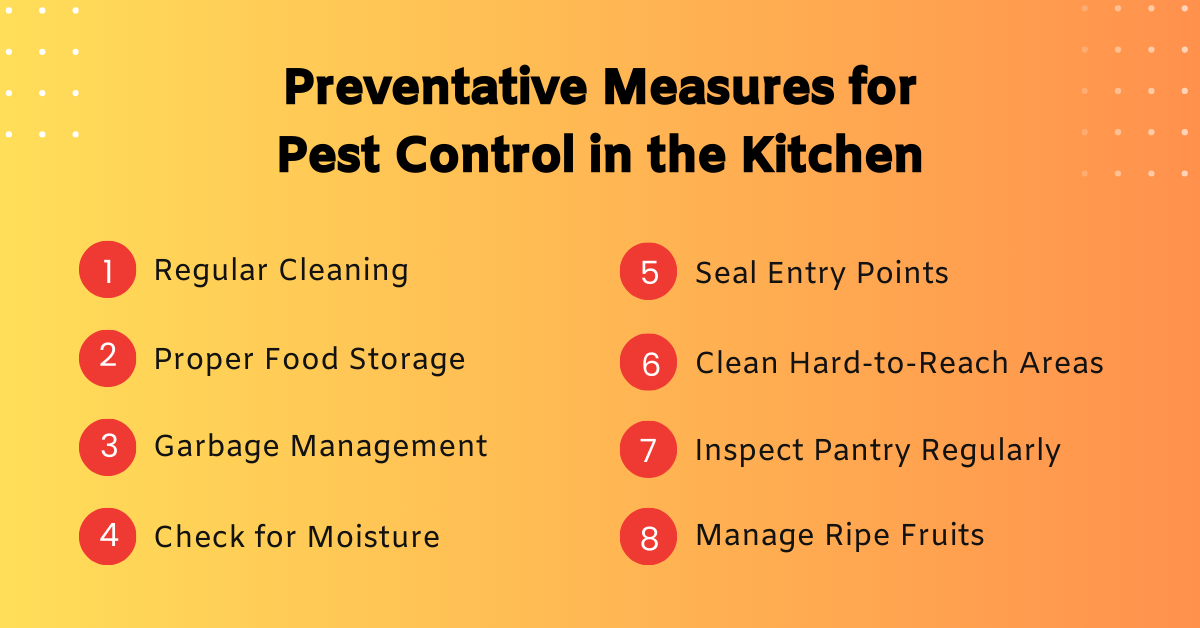
Pest control in the kitchen primarily focuses on preventive measures. The goal is to establish an environment that deters pests. This involves maintaining cleanliness, ensuring proper food storage, and eliminating easy access points for pests. Below are some straightforward steps that significantly contribute to preventing pest infestations in your kitchen:
- Regular Cleaning: Clean kitchen surfaces like counters, floors, and tables. Wipe them down after every meal using a good cleaner or a homemade mix of water and vinegar. This helps remove food particles and spills that attract pests. Don’t forget to clean appliances like microwaves and toasters, where crumbs can easily accumulate.
- Proper Food Storage: Use airtight containers, including pet food. This prevents pests from smelling and accessing your food. Regularly check the seals of these containers and replace them if worn out.
- Garbage Management: Empty your kitchen bin regularly, preferably every day. Clean your bins with hot water and soap at least once a week to eliminate lingering food smells that might attract pests. Consider using bins with tight-fitting lids.
- Check for Moisture: Eliminate sources of standing water. Repair any leaking pipes or faucets, as pests are attracted to moisture. Ensure that dish rags and sponges are hung to dry and not left in a wet pile.
- Seal Entry Points: Regularly inspect your kitchen for cracks, holes, or gaps. Common entry points for pests include areas around windows, doors, and where pipes enter walls. Use sealant or weather-stripping to close these gaps. This step is particularly important as seasons change and pests look for warm places to stay.
- Clean Hard-to-Reach Areas: Pay special attention to areas not cleaned daily, like under the refrigerator, stove, or in the back of cabinets and drawers. Food particles and grease accumulating in these places are a big draw for pests.
- Inspect Pantry Regularly: Keep an eye on your pantry. Check the packaging for holes or tears, and look for signs of pests like droppings or unusual smells. Rotate your stock and use older items first to keep your pantry fresh and less appealing to pests.
- Manage Ripe Fruits: Fruit flies are attracted to ripe and fermenting fruits. Store such fruits in the refrigerator. Regularly check fruit bowls for overripe fruits and dispose of them promptly.
Natural Remedies for Pest Control in Kitchen
When it comes to pest control in kitchen spaces, natural remedies can be both safe and effective. Plenty of natural methods are not only good at getting rid of pests but are also safe to use where you cook and eat with your family. Let’s take a look at some of these natural and friendly solutions:
- Vinegar Solution for Ants: Ants dislike the smell of vinegar. Mix equal water and vinegar in a spray bottle to clean countertops, floors, and other areas where ants are seen. This simple solution can keep ants from marching into your kitchen.
- Essential Oils for Various Pests: Essential oils like peppermint, eucalyptus, and lavender are not just for aromatherapy; they can also repel pests. For example, peppermint oil is great for keeping spiders and ants away. Just add a few drops of water and spray around your kitchen.
- Natural Predators: Nature has its way of controlling pests. Nematodes, tiny worms, are natural predators of many garden pests and can be used in potted plants in your kitchen. They help in controlling pests like fruit flies by attacking their larvae.
- Diatomaceous Earth for Crawling Pests: This powder is made from fossilized algae. When sprinkled in areas where bugs like cockroaches and ants walk, it sticks to their bodies and dehydrates them. It’s non-toxic to humans and pets but deadly to small pests.
- Citrus Peels to Deter Flies: Flies dislike the smell of citrus. You can use leftover peels from oranges, lemons, or limes to keep them away. Place the peels around your kitchen, or make a citrus spray by boiling peels in water.
- Herbs as Pest Repellents: Growing herbs like basil, rosemary, and mint in your kitchen provides fresh cooking ingredients and helps keep flies and mosquitoes away. These herbs naturally repel many types of pests.
- Cucumber Slices Against Ants: Surprisingly, ants have an aversion to cucumber. Placing cucumber slices or peels in areas where ants are frequent can help in deterring them.
- Clove Oil for Pest Control: Clove oil is another natural repellent. It’s especially effective against flying insects. Mix it with water and spray it around your kitchen to keep the pests at bay.
When to Use Chemical Pest Control
In severe infestations, pest control in the kitchen may require chemical solutions. This involves employing various substances, from sprays and powders to baits and traps, to eliminate or deter pests.
While these methods are effective, they must be used carefully to prevent potential health risks. Here’s a guide on safely and effectively utilizing these chemical methods for pest control in your kitchen:
- Read Labels Carefully: Understanding the product’s instructions and warnings is crucial. This information guides you on how to use the product safely and what to do in case of accidental exposure.
- Choose the Right Product: Select a pest control product specifically designed for the pests you’re dealing with. For instance, what works for ants might not be effective against rodents.
- Use Baits and Traps: Prefer baits and traps over sprays. These are typically safer as they localize the chemicals, reducing the risk of spreading toxins in your kitchen.
- Avoid Spraying Near Food: Never spray chemicals near food, dishes, or cooking utensils. Remove these items before spraying, and clean the area thoroughly afterward.
- Wear Protective Gear: Protect yourself by wearing gloves, a mask, and even safety goggles when applying chemical pest control products to prevent skin contact and inhalation.
- Keep Children and Pets Away: Ensure that kids and pets are not in the area during application and until the chemicals have dried or the area has been aired out.
- Ventilate the Area: Proper ventilation is key after using any chemical product. Open windows and doors to circulate fresh air and clear out harmful fumes.
- Dispose of Chemicals Properly: Follow your local guidelines for the disposal of chemical pest control products and their containers to avoid environmental contamination.
- Consider Professional Help: If you’re unsure about using chemicals, hiring professional pest control services is often safer and more effective.
You can read our blog, The guide to best practices for pest control, to gain more insights about pest control.
Pest Control in Kitchen: Maintenance and Long-Term Prevention
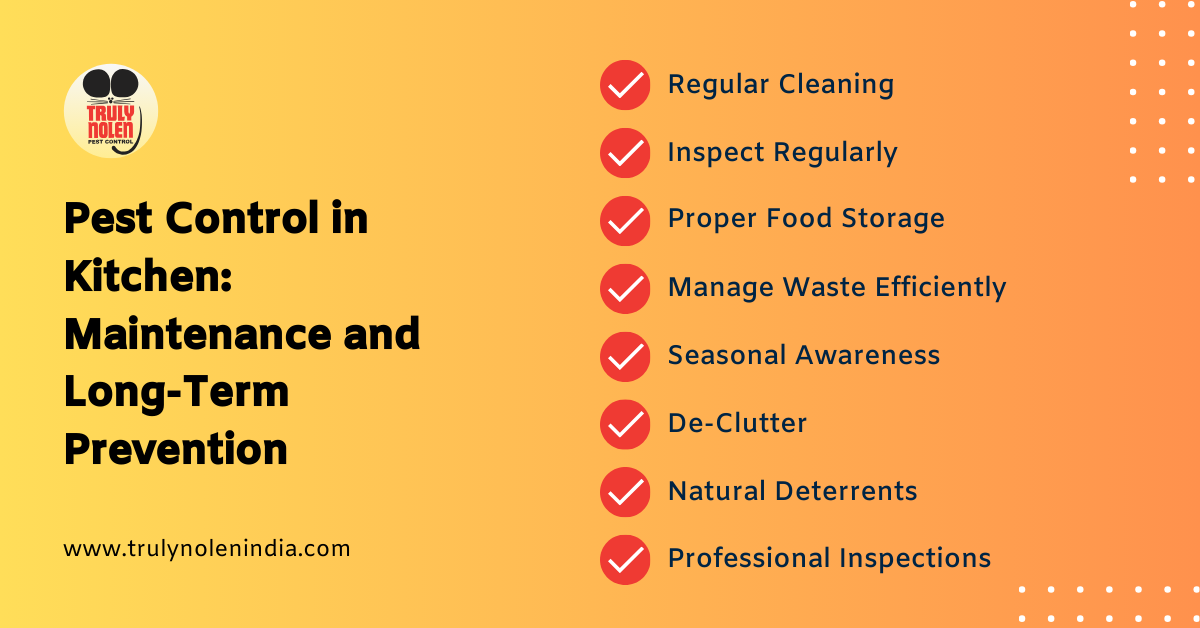
Consistent cleaning and upkeep are crucial for pest control in kitchen, ensuring the area remains devoid of harmful bacteria and germs that lead to foodborne illnesses. Maintaining cleanliness of surfaces, utensils, and appliances greatly diminishes contamination risks, safeguarding your family’s health.
Below is a checklist to assist in maintaining and preventing long-term issues related to pest control in your kitchen:
- Regular Cleaning: Make sure to clean your kitchen thoroughly on a regular basis. Wipe down surfaces, sweep and mop the floors, and immediately clean up crumbs and spills. This helps to remove food sources that attract pests.
- Inspect Regularly: Check your kitchen for any signs of pests, like droppings, nests, or damage to food packages. Pay special attention to hidden areas like behind appliances and inside cabinets.
- Proper Food Storage: Store food in airtight containers. This keeps your food fresh and prevents pests from smelling and accessing it.
- Manage Waste Efficiently: Dispose of garbage regularly and use bins with tight-fitting lids. This reduces the chances of pests being attracted to your kitchen.
- Seasonal Awareness: Be aware of the types of pests more common in different seasons and take specific preventive measures accordingly.
- De-Clutter: Reduce clutter in your kitchen where pests can hide. Organize your pantry and kitchen areas to be tidy and less inviting to pests.
- Natural Deterrents: Use natural deterrents like herbs and essential oils that repel pests. For example, peppermint oil can deter ants and spiders.
- Professional Inspections: Consider having a professional pest control service inspect your home annually. They can spot potential problems you might miss.
You can learn more about pest control by reading our blog, What are the different types of pest control treatment?
Experience Effective Pest Control Services With Truly Pest Solution!
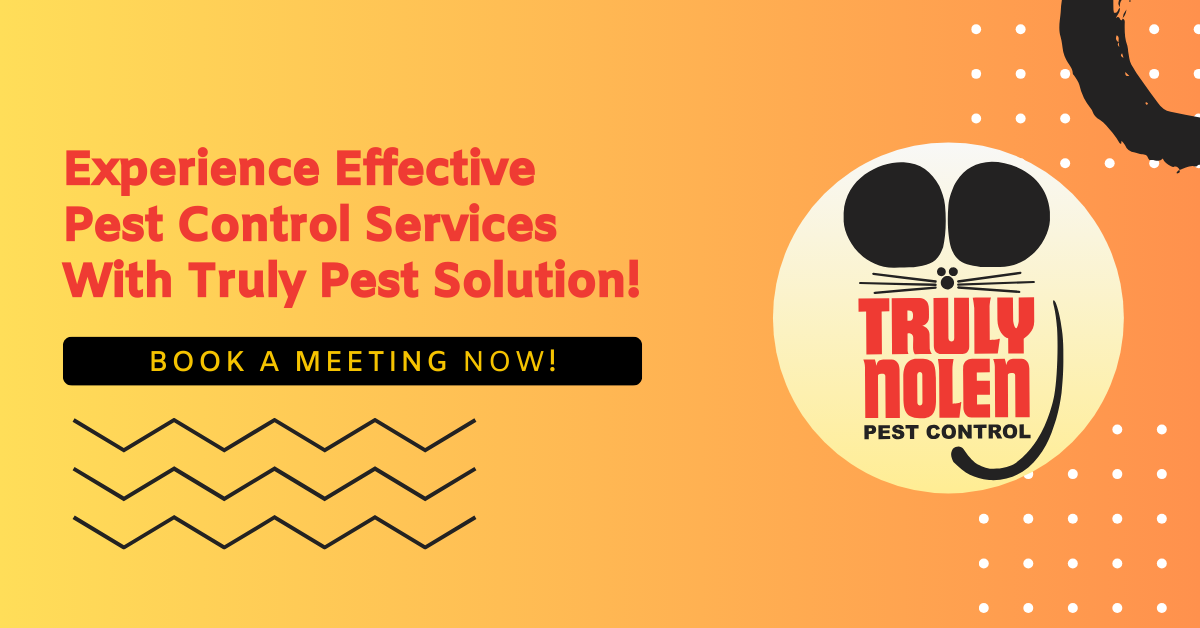
Keeping your kitchen free from pests is vital for the health and well-being of you and your family. With the tips and strategies discussed, you’re well on your way to maintaining a clean and secure kitchen environment. Remember, being consistent and vigilant is crucial in preventing pest infestations.
At Truly Pest Solution, we bring years of expertise in TTC, ISGS, IBBS, IFCS to ensure clean and safe environments. Our dedicated team of experts doesn’t just get the job done; they get it done right. Using advanced pest control methods, we tackle your pest problems head-on. Don’t let pests take over your home.
Contact Truly Pest Solution today.
Book a meeting now!
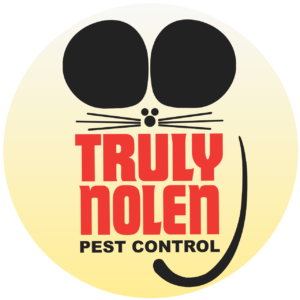
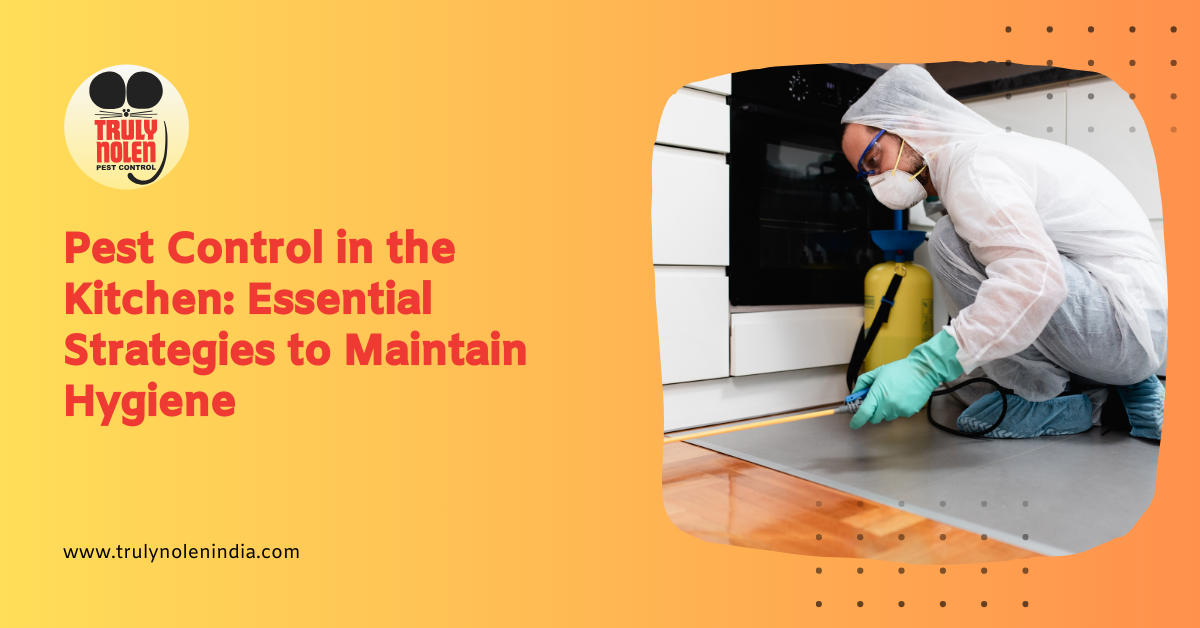
Leave a Reply